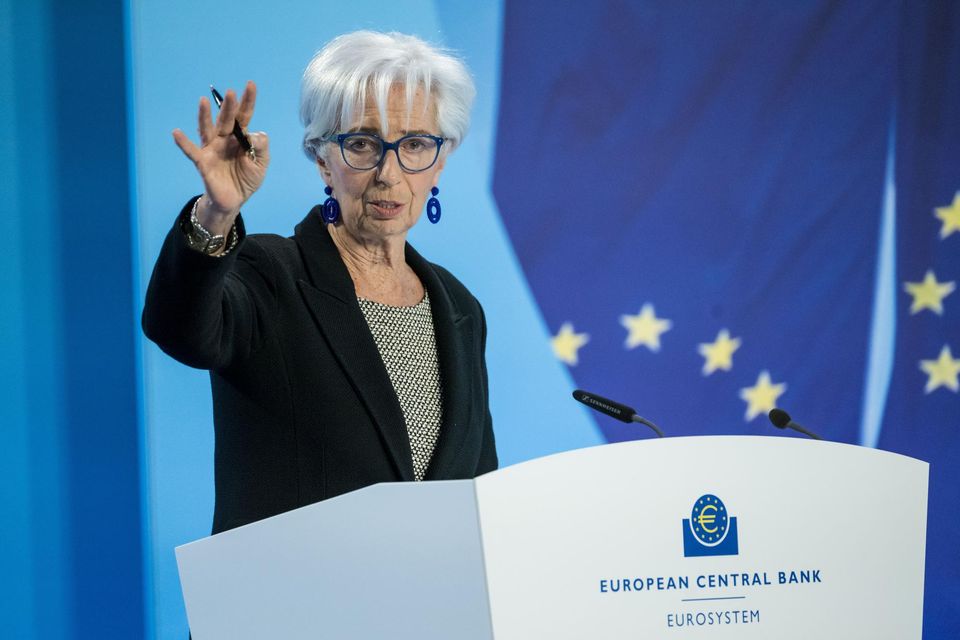Digital Zeitgeist – Eurozone in Turbulence: ECB’s Historic Interest Rate Hike Spells Uncertainty for Exhausted Economies
In the face of unprecedented economic headwinds, the European Central Bank (ECB) has embarked on a bold strategy, raising its main deposit rate to a record high of 4%, a move viewed with apprehension by the beleaguered economies of the Eurozone. As analysts ponder the potential ramifications, the pulse of the market is one of trepidation with concerns centred on weak consumer spending, especially in Germany, the EU’s powerhouse. With the Eurozone caught in the vortex of economic stagnation, this article delves deep into the nuances of the recent ECB’s decision and its potential global economic repercussions.
A Historic Hike Amidst Recessionary Winds
Drawing parallels with interest rate trajectories in the UK and the US, the ECB’s recent quarter-percent hike represents the highest point in the Euro’s history. While the necessity of controlling inflation — projected to reach 5.6% this year — cannot be overstated, the backdrop of a pervasive slowdown in private sector activity across the 20-member Eurozone makes this increase in borrowing costs unwelcome news for many.
With its recessionary economy, Germany is grappling with a grim forecast featuring a 0.5% contraction in GDP for this year, according to analyses by the Kiel Institute. The German populace has responded by ramping up their savings, putting a dampener on consumer spending — a trend echoed in France and Italy, both teetering on the edge of economic stagnation with marginal growth rates.
Lagarde’s Pledge: A Beacon of Stability or a Harbinger of Stagnation?
In the midst of economic turmoil, ECB president Christine Lagarde has been steering the Eurozone with a determined vision. Signalling that 4% is likely the apex of this cycle, she envisages maintaining this interest rate through 2024. While international investors align with this outlook, doubts linger regarding the duration of this strategy amidst volatile global markets.
A precarious balance must be struck; the ECB needs to avoid instigating a downward spiral involving increased unemployment and triggering corporate bankruptcies, while also staving off above-target inflation with historically high interest rates. The global financial system watches with bated breath as Lagarde navigates this narrow strait, where any misstep could exacerbate economic fragility.
National Narratives: A Tapestry of Economic Fortunes
Within the Eurozone, national economies present a mosaic of varying fortunes. Spain stands as a beacon of resilience, bolstering household spending power through assertive interventions such as capping energy price hikes, thus projecting promising growth rates of 2.2% and 1.9% for the next two years respectively.
Contrastingly, France and Italy find themselves ensnared in a web of sluggish growth, with the European Commission projecting painfully slow progress in the coming years; a testimony to the populace’s preference for saving over spending in these uncertain times.
Global Repercussions: The World Watches On
The ECB’s historic rate hike has not only continental but global repercussions, potentially influencing financial market dynamics worldwide. International investors are keenly analysing Lagarde’s stance, as a prolonged period of high-interest rates could impact global investment trends and economic stability.
As a significant entity in the global economic landscape, the Eurozone has its economic health intrinsically linked to world financial systems. A stagnating Eurozone could potentially echo in the international markets, influencing global investment strategies and economic policies.
Furthermore, the geopolitical landscape could be influenced significantly. Nations heavily invested in the Eurozone may recalibrate their strategies, while the EU’s role on the world stage could potentially be reshaped, guided by economic pragmatism and the necessity to foster stronger alliances to safeguard economic interests.
Conclusion: Navigating Uncharted Waters with Pragmatic Optimism
As we stand on the cusp of potentially tectonic shifts in the global economic landscape, the ECB’s strategy delineates a pathway laden with challenges and uncertainties. While striving to curtail inflation — targeted to ease closer to the desirable 2% by 2025 — it is imperative for the Eurozone economies to foster growth and stability amidst an undulating economic terrain.
The fragile economies within the Eurozone find themselves at a critical juncture, tasked with fostering recovery while ensnaring runaway inflation. The strategies adopted in the coming months will be pivotal, having far-reaching implications not just for the Eurozone but for the global economic canvas.
As we forge into uncharted territories, the dexterity with which the ECB, under Christine Lagarde’s stewardship, navigates this intricate maze of economic variables, will have reverberating consequences on the global stage. The world watches on, with hopes pinned on pragmatic optimism and a coordinated effort to steer the ship through turbulent waters towards a horizon of stability and renewed prosperity.
A chapter in global economic history is unfolding before our eyes, and the ECB’s strategies in these testing times will either be hailed as visionary foresight or admonished as missteps in the annals of economic history. It is indeed a critical juncture where financial prudence, foresight, and a collaborative spirit will determine the trajectory of not just the Eurozone but the global financial landscape in the years to come.
Disclaimer: The views and opinions expressed in this article are those of the author and do not necessarily reflect the official policy or position of GPM-Invest or any other organisations mentioned. The information provided is based on contemporary sourced digital content and does not constitute financial or investment advice. Readers are encouraged to conduct further research and analysis before making any investment decisions.

